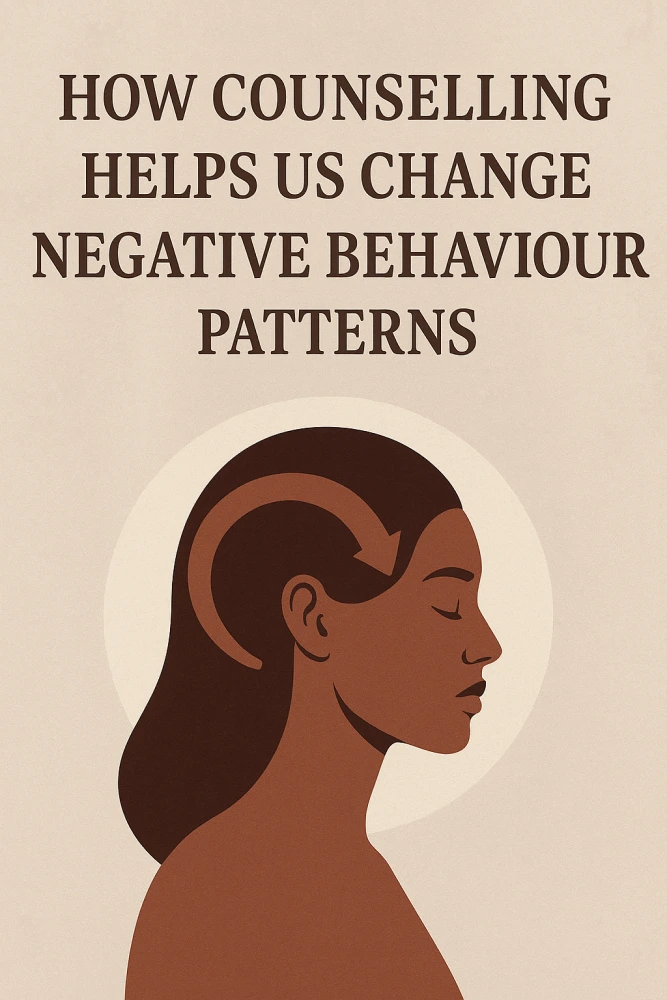How Counselling Helps Us Change Negative Behaviour Patterns
As a counsellor, I often meet people who feel stuck in patterns of behaviour that no longer serve them. They know the cycle they’re in, they can even see how it damages relationships or holds them back, yet change feels almost impossible.
Why? Because these patterns were once our survival strategies.
When we are young, we learn quickly what keeps us safe, noticed, or loved. If a child discovers that making their parents laugh is the only way to gain attention in a busy household, humour becomes their shield and their lifeline. Furthermore, staying quiet and agreeable may help prevent conflict. For someone else, working hard and achieving may become the only path to recognition.
At the time, these strategies work. They help us meet essential needs: for connection, safety, and belonging. But as we grow older, they become outdated. What once kept us safe now limits us. The trouble is that finding an alternative can feel intimidating.
Case Example 1: Sarah – The Peacemaker
Sarah grew up in a family where arguments often spiralled into shouting. As a child, she learnt that staying quiet and smoothing things over kept the peace. Now in her 30s, Sarah notices that she tends to avoid conflict at work and in her relationships. She agrees to things she doesn’t want, then feels resentful.
In counselling, Sarah began to see how her silence was still serving her, protecting her from the fear of rejection. But she also realised it was costing her voice, her boundaries, her sense of self. Together, we practised small steps: saying no to minor requests, experimenting with “I feel” statements, and tolerating the discomfort that followed. Over time, Sarah discovered that her relationships grew stronger, not weaker, when she expressed her needs.
Case Example 2: David – The Joker
David’s childhood was marked by absence. His parents were preoccupied with work and often emotionally distant from him. He learnt to be the entertainer, the joker who could always make people laugh. It was his way of being seen.
As an adult, David felt exhausted by always being “on.” He realised that people didn’t know the real him, only the persona he projected. In therapy, we explored the fear underneath: the belief that if he weren’t funny, he wouldn’t be loved. Slowly, David began experimenting with showing sadness and vulnerability to trusted people. To his surprise, his friendships deepened. His worth was no longer tied to being the comedian in the room.
How Counselling Creates Change
Counselling works because it provides a safe space to:
* Recognise old patterns – seeing how your current behaviour links back to survival strategies.
* Understand the fear – acknowledging why change feels risky and why you cling to familiar ways.
* Experiment with new behaviours – trying out healthier alternatives in a supportive environment.
* Build resilience – learning that you can tolerate discomfort and still be safe.
Through therapy, we don’t erase your old strategies; they were brilliant adaptations. Instead, we add new tools to your toolkit, giving you freedom and choice.
Why This Matters
If you feel trapped by habits like avoiding conflict, people-pleasing, overworking, or relying on humour, know this: these are not character flaws. They are echoes of strategies that once kept you safe. With counselling, you can learn new ways of relating, ways that serve the adult you are now, not just the child you once were.
Call to Action:
If this resonates, and you’d like support in understanding and changing negative behaviour patterns, I offer counselling for individuals, couples, and young people. Together we can explore your story, unpick outdated patterns, and find healthier, more fulfilling ways forward.

